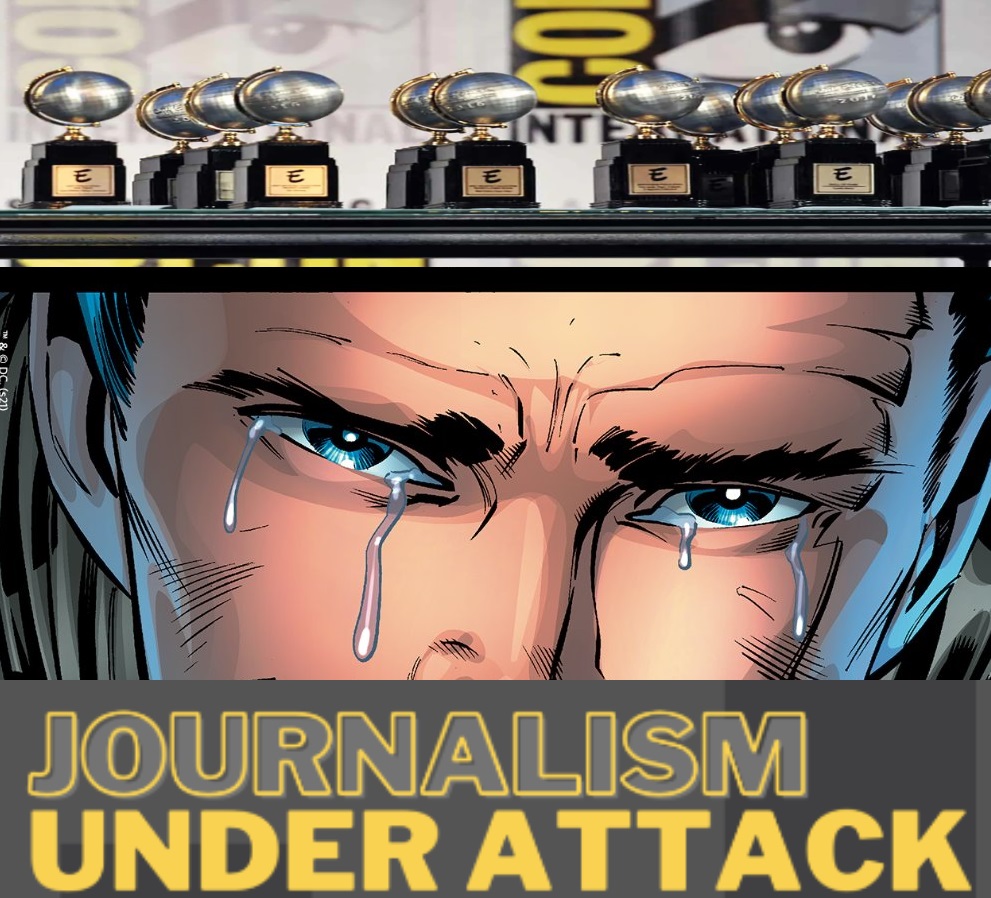
You cannot imagine my sense of tangible relief when my overwhelming self-awareness kicked into overdrive and reminded me that I am not, you know, a comics journalist. For this month especially has been a notable one for the collected members of that specific community, as the long-running Eisner Awards recently announced they were removing the category for “Best Comic-Related Publication or Journalism” award, a decision that itself prompted much discussion and outcry. And whining.
It’s not that I don’t have compassion and empathy for many of the fine writers whose work I respect and appreciate- it’s that the overall issue here is really not that mystifying and has many layers of self-inflicted wounds that, over time, has caused the collective body to collapse. For the Eisner Awards have always been a self-congratulating circle jerk for an industry that was, at one time, entirely based upon validating a medium and a hobby that the majority of professionals that worked within it were deeply insecure over.
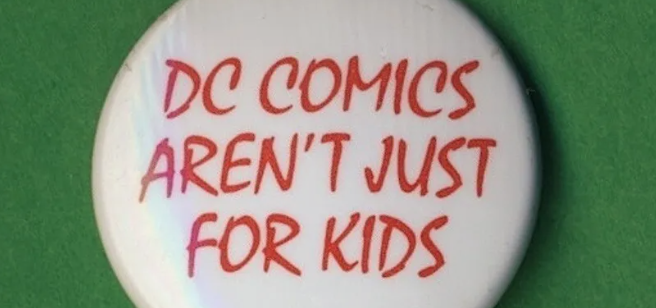
The Eisner Awards themselves were began to not just help promote new books in an ever-competitive market, but also to give the illusion of prestige to an industry initially based upon cheap thrills and escapism. The Eighties especially were a time where geeks everywhere were aging into jobs in media, and getting your comic mentioned in a blurb in SPIN Magazine suddenly gave you Fonz-like coolness and credibility within a community that relished its one-step-above letter page writers tier structure. Of course, much like motion picture adaptions, blurbs and mentions in “mainstream” publications never increased monthly sales or built that many more readers– but that’s another discussion.
What Jackie Estrada and other Eisner Award related staffers won’t tell you is the real reason for the remake from the initial Jack Kirby Awards, instigated by David Olbrich and Fantagraphics in 1985, to the Eisner Awards in 1988. Olbrich had wanted to counter the Comic Buyer’s Guide Fan Awards and wrote later that a dispute he had with former employers Fantagraphics caused Jack Kirby to personally call Olbrich and have his name removed so that he wouldn’t appear to align with either side.

While there’s no doubt that Kirby made this gesture, the real impetus for the name change came from a more commercially based standpoint, one that Kirby was unaware of: the people involved with structuring and promoting the Eisner Awards for the comics industry’s benefit had recognized that using the Kirby name might, logically, cause potential issues if they hoped to involve/nominate/award anyone from Marvel Comics– whether it be Stan Lee or any other creator or publication coming from the lauded House of Ideas. 1987 was the height of fan awareness and creator friction over the Kirby vs. Marvel original artwork scandal- the passion displayed by fan and pro alike had the potential to ostracize various parties based on allegiance and employer. So, a more neutral figure was chosen to lend his name to what was hoped to be comic’s prestigious answer to the Oscars.
- “Well, for one thing, I think people in comics don’t have real high standards for writing, and for another thing, it’s because they worship Will Eisner like a god. And certain guys can do no wrong… I don’t think that, if he were to write prose stories like that, I don’t think (non-comics) people would take his work real seriously.” – Harvey Pekar, 1993 (on why comic professionals put Eisner on a pedestal)
It seems like I’m looking to provoke with this next thing, but- really. I “didn’t get” Eisner when I was a teenager, and I still don’t like him today. I mean, I get that his sense of staging and framing in The Spirit in the Forties is highly influential- but I have always believed a large part of the praise given to him is because comics people needed an Eisner. They needed an Orson Welles of comics because they were always insecure about comics. It’s yet another form of having a false sophistication to point to against perceived nay-sayers. Because comic people always want non-comic people to not judge them– as in, don’t appear to show bemusement or disinterest towards their obsessive passion for super-heroes. (Seriously- it really is just that.)
But mostly? I never got why the use of Ebony White wasn’t a bigger deal to the comics people. Seriously, it’s just… impossible not to fuckin’ see this.

We often see rationalizations for the harmful racial caricatures of the past and the Forties- comic’s Golden Age– was especially prolific with racist depictions, largely of Japanese people but especially the rare African-American character. Ebony is a huge part of Eisner’s Spirit work, and he is impossible to avoid. He was also a huge barrier towards my giving any serious effort to examine Eisner’s comic book work. But the most prestigious award in comics– is named after this guy.
I didn’t know much about Eisner’s documented, if any, commentary on Ebony but I could predict it. I predicted Eisner was largely apologetic, explaining that his hands were tied due to publishers not wanting to lose distribution in the rural South, the standards of the time, blah blah blah.
Guess what? My predictions were all wrong. Eisner was never apologetic. On the contrary, he was defensive and impatient. He referenced Charles Dickens’s portrayal of Fagin the Jew and then tried to tie in Ebony with Tom Sawyer.
I really do consider myself fairly well read with a great ability to recall most anything I’ve absorbed but was (deliberately) unaware of the ongoing argument(s) about the Ebony character, such was my distaste and boredom with Will Eisner as a creator and personality. I should like to stress here that, in researching this today, I discovered a fine piece by Noah Berlatsky in 2011 that I would be remiss if I didn’t mention. https://www.hoodedutilitarian.com/2011/02/will-eisner-is-no-mark-twain/
- “But I also think that if someone were to look at The Spirit and say, “fuck this racist shit” — well, that would be a really, really defensible position, because that shit is racist.” – Noah Berlatsky, a rare case of a comics people actually not rationalizing the glorious Will Eisner, 2011
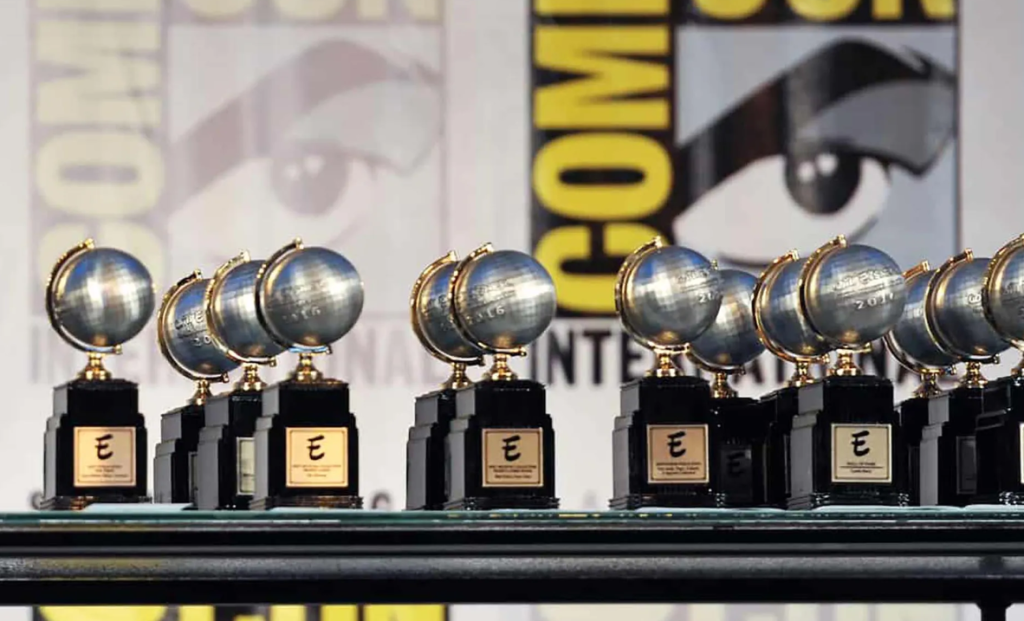
So yeah. The most prestigious award in the comic book industry is named for a talented comic creator who also displayed blatant and casual racism for decades. Kinda shitty. That’s just me.
Anyhow. Now that I’ve established how little ceremony I stand on regarding the Eisner Awards, let me say this in regard to their decision to cancel the comics journalism category.
Can you blame them??
There could be an argument as to what constitutes “comics journalism” in 2024- but I think it is fair to say that, largely, it is a cesspool of glorified (and literal) press releases, lists, and rewritten and regurgitated lies that pass through with zero research or fact-checking.
I also admit I’m ignorant as to what the standards for certain sites are to be eligible for that consideration- for example, there are numerous online sites and blogs that have fine writing and informative content- but their content is not strictly comic books. So, I’m unsure if they could have won said award to begin with! See, I told you I’m not a journalist.

I did a cursory look at websites that were comics-centric and geek-based- the kind of sites that have “comic” and “geek” literally in their URLs. The results were glorious!
Comics Journalism! The majority of websites devoting their energy to comics and their related offspring- all, how shall we say, sort of detour from any actual journalism whatsoever. Looking at it from this perspective kind of shines light as to why the Eisners might have rethought continuing this category- or perhaps it was just getting harder to find actual critical writing and factual research and reporting every time they had to wade through the fandom swamp.

The outcry was from, understandably (and expectedly), barons and gurus of comics reporting. And I’ll admit, some of them have justifiable reasons to call out the Eisners for making this decision. Curiously though, none that I saw really called out the multitude of fan-turned-writer-due-to-social-media content that may have diluted their field and therefore made it harder for them.

Rob Salkowitz penned an editorial on ICv2 bemoaning the decision and explaining why, in his opinion, the people writing about comics and the comics industry almost deserve a pass, since they’re just so passionate about it all:
- “The Eisners should recognize media that helps our industry. Journalists can get a bad rap sometimes, but those of us writing about comics tend to have genuine affection for the medium and for a lot of the people in it. And, increasingly, doing this work is a labor of love. In the words of the great comics journalist Heidi MacDonald, the best way to make a small fortune writing about comics is to start with a large fortune.” – Rob Salkowitz, Jan 12th, 2024
I mean, I don’t dislike Rob Salkowitz, who has done some very good work- and I like good comics writing- but I’m never sympathetic to the undertone of “we don’t make a lot of money, we do it because we love it“, etc etc mentality- I get that, I can respect that, but- again, that doesn’t mean you are entitled to anything. You aren’t owed the infrastructure to enable you to continue exercising your passion just because you’re passionate.
It reminds me of a comment exchange I once observed between retailer Brian Hibbs and someone I can’t remember, in which they responded to Hibbs’s downbeat reporting of not making a profit with asking what their business plan was- which I think is a not unreasonable question. Hibbs responded with righteous anger, shaming the questioner with the explanation that people that buy and invest into comic book stores did it because they love it, damn it- logic and finances be damned!

Salkowitz went on to say that ICv2’s recent coverage of the 50th Anniversary and History of the Direct Market was a reasonable example of good comics journalism. I don’t disagree that a decent amount of fact-based history and investigative research went into that coverage; it ends with an interview with unavoidable and entitled retailer Chuck Rozanski, who concludes his interview with this gem:
- “I’m one of the few people in this business who has actually made a lot of money doing this. I own this building, which is valued at $10 million. I own everything in this building, and I own a lot more stuff besides that. You may not like me. You may think that I’m an arrogant little POS, but I’ve been at this game 53 years. I won, bitch.”– Chuck Rozanski of Mile High Comics, Dec 2023

The comics industry continues to shrink; it becomes more insular, more incestuous, less approachable. It’s filled with factions and fiefdoms and a tier system of acceptance. It’s no surprise that the coverage of such an industry would continue to waste away as well.
To continue the lamenting that they themselves enabled with a regular output of glorified pap, we have the living legend Heidi MacDonald herself, the grand dame of The Beat.
Heidi wanted to be Joan Didion. She hasn’t realized she’s Barbara Walters.
In a piece titled “I guess I’ll never get to wear my Eisner Awards dress again“, MacDonald reminds us that “I have BEEN to almost every Eisner Awards ceremony since the first because that’s how I roll.”, securing her bona fides as an insider of renown (which is legitimate) before displaying a surprising lack of awareness, no doubt enforced by her years in the industry.
- “In other words, comics folks are generally not as class conscious as some other artforms.” – Heidi MacDonald
Uh… what?! They aren’t?

I can assure that snobbery, elitism, gatekeeping and sense of status is staggering within comics- whether it’s pros, critics or fandom. Do you think the people who attend MoCCA Fest look at the guys in Deadpool t-shirts as their peers? Do you think those same guys wearing cargo shorts and Legend of Zelda t-shirts looking at Alt/Small Press comics look at those people as their equals?
Fuck NO, they do not. They are ENTIRELY conscious of their interests, their personas, the things they support, and so forth.
There are specific types of comic readers that are so prolific in their contributions to social media and message boards that make it hard pressed to accuse me of stereotyping. Does MacDonald really not believe that there’s a distinct amount of art school graduates with hipster/indie cred working in zines and being reviewed by Tegan O’Neil?
Does she not think there’s a huge proportion of bearded white guy comic bros, debating “Woke” super-heroes and arguing Star Wars television writing? How are these subsects not classist? Do you think the members of Fort Kirby aren’t classist? Do you think Ed Piskor isn’t (even if he lacks the comprehension to realize he is)?

That one remark gives away the narrow viewpoint of an individual who, admittedly, has spent decades in the industry and has, also admittedly, contributed some very good things to a number of publications since the Eighties. But wow. Maybe going to the Eisners every year limits one’s exposure. I also know how MacDonald can act towards someone who does work for, say, ReedPop, versus someone who doesn’t– just saying.
- “And aside from losing our tatty little Eisner Award, times have never, ever been worse for comics writing on the internet, and I say that as someone who has written some “state of the industry” piece every year for 20 years. Newsarama is no more. CBR, I’m told, is limited to a handful of stories about comics a day. I know the Popverse gang is doing its best, but their front page is 90% media headlines. I was told this week that comics coverage has been cut almost entirely at another fairly prominent pop culture site. Comics news just doesn’t get any traffic and the cold equations say that it doesn’t pay so out it goes.” – Heidi MacDonald, comicsbeat.com
Comics news just doesn’t get any traffic. Instead of examining the why something doesn’t work- really- it’s easier for most parties involved to simply blame it on AI, downsizing, metrics. Not once do any of these journalists consider that maybe what they are offering just isn’t that good or interesting.
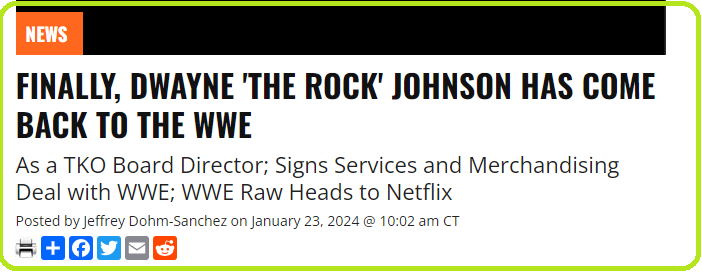
- “That’s what we’re up against, folks. Google has absolutely pulverized small, independent websites unless you aggressively game the system with SEO/SERPs trick, and AI has made that even more difficult, and made original human-crafted content even harder to find. The blogosphere is dead, and unless you want to work side by side with Nazis the newsletter revolution has stalled out. And now, not even an Eisner Award nomination.” – Heidi MacDonald
The world of comics is rich with a “don’t look back” approach, especially pertaining to cause and effect. The blogosphere is dead- why? People seek other outlets for news- okay, so then what? There’s rarely a sense of awareness or accountability with these people. They rationalize and peddle lies so as not to alienate publishers or risk losing their status as an insider– one step above letter-writing fan. Such is the feeling of being inside this industry that sent you so as a young person.
Comics news is mostly embarrassing. Blogs are seldom better. Nostalgia from aging boomers, staying on the good side of Marvel Editors, trying to entice the people who strictly watch The Walking Dead and would never open up a comic book in their life- it’s a path fraught with potential landmines! And again, it’s never their content. Don’t you get it?? These people love comics so much! That, in itself, should sustain their glorified wanking and endless anecdotes about their boring careers as writers writing about other people’s stories.
At the risk of sounding like Heidi MacDonald by mentioning myself, I simply must share a portion of an exchange I had with her shortly after her piece was posted. I commented my honest response which no one has to agree with- but MacDonald’s response really showed that she didn’t understand what I wrote at all. Or decided not to directly respond to what I wrote at all. Or… you know, I’m such a bad writer that I couldn’t convey exactly what I meant… entirely possible.
- “With respect Heidi, the comics “journalism” sector has largely evolved into sites that regurgitate press releases from publishers. Or have unpaid ‘writers’ re-write said press releases, which lead to critical errors like your own site’s recent crediting of Joe Simon as the sole creator of Captain America.
- The Eisner Awards are a glorified circle jerk anyway, created to simply validate an industry’s own feelings of insecurity and desperation to be taken seriously by a mainstream that never did. When you look at that as the catalyst for their existence, its easier to shrug this off. Outside of your rare pieces like this and a Brian Hibbs lecture, what journalism is the Beat putting forth, honestly? It’s understandably a pop culture dispatch now.” – your man, sure to never be invited to a comicsbeat party EVER now

- “Four Color, if you hit the “Column” link on the menu you’ll see a bunch of original writing by our staff over the years. What some people call “regurgitating press releases” is also called “news” and we try to present it as entertainingly as possible and as often as we can go beyond the pr for context and information.
- Since you seem to be alluding to the idea that somehow comics journalism sites being positive destroyed the comics industry….maybe you can explain just how that works? Because it’s a bit like saying “The tide went out….and that’s why Our Flag Means Death got cancelled.” There’s no logical connection I can see.” – Heidi MacDonald, owning me as only a true journalist can (and notably establishing that I can’t “maybe explain just how that works” as she closed comments immediately after responding- ensuring that the grand dame always gets the last word)
I really did not allude to any idea that the comics industry was destroyed by journalism sites being positive. I am bewildered by this and how someone as brilliant, if misguided, as MacDonald could glean this from what I wrote.
What I have tried to establish, and even illustrate with the screen captures displayed throughout this article, is- “comics journalism sites”? “Are just NOT GOOD. They’re even destructive and unhealthy. They push corporate propaganda, they are lazy and uninformed, they are enabling and compromised glory hounds. That is not my opinion; it is an observation. When you have websites that you- not me- believe constitute comics journalism and they leave off Jack Kirby as a co-creator– in 2024!- that is a staggering act of irresponsibility. People have every right to not only call out such “reporting”, but also- tune out. Which I believe is what has been happening for the past decade. Hence, where we are now.

So, if the Eisner Awards- the prestigious self-sustaining, self-voting, self-regulating comics professionals’ validation committee to remain relevant and hopefully use a blurb or “Eisner Nominee” on their TPB cover to sell more books- named after a casual racist when it came to Black people- if they decide, in their wisdom, to delete a category that really isn’t pulling its weight– how dare you complain about it? You are part of why they did it.
Comics Journalism IS important. And essential. And both promotes and validates actual GOOD work, that HAS a larger audience out there- and, oftentimes, that audience just doesn’t KNOW it yet. We need comics journalism. Therefore, my advice is simple: get into policing your brethren. Induce self-regulation. Call out rival websites and peers for being selective and untruthful. Write more things that people positively can’t look away from. Writing essays to the converted is preaching to the choir. And comics professionals are no different from actors- they only scan what you write to see if their name was mentioned.
Of course, what do I know? I’m just a lowly blog writer. Who is content to remain unknown and not try to position myself as a personality. But I do know when people are bullshitting. And I do consider, in part, this blog as a product of all the comic sites I just assailed above: because truthfully- if they’d done their jobs correctly, I wouldn’t have to write this.
- “There is no reason why they were worth honoring at the Eisner Awards for the past 35 years, give or take, and are suddenly no longer worth their own category in 2024.” – Rob Salkowitz
There are plenty of reasons, Rob. Look at the headlines displayed throughout this article.
with thanks to Rob Salkowitz, Heidi MacDonald, Rob Granito, and all of the too-cool-to-care comic hipsters
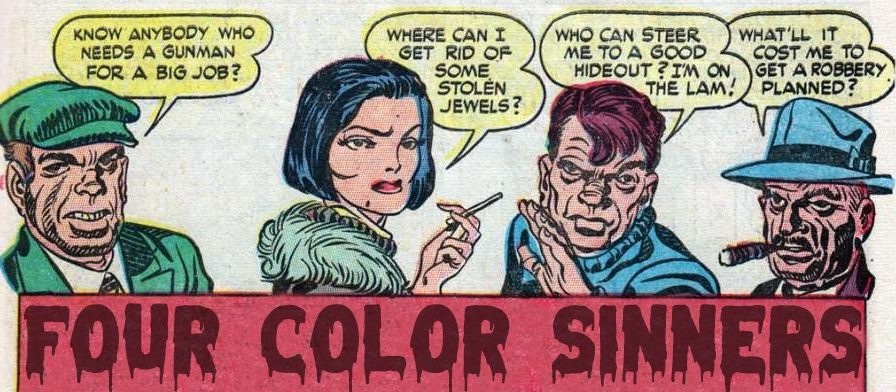
Why thank Granito, was that just for the lolz? , 😆
LikeLiked by 1 person
Rob Granito not only unified the comics press at the time, it unified fandom and pros alike. No one would resist jumping on the Granito-bashing outrage- it was something to see! Therefore, Granito is the greatest proof of how utterly incompetent the “comics press” were/are as actual journalists.
LikeLiked by 2 people
Bottom line: There’s not enough interest. Comic books from the big two are returning to their roots as as inexpensive giveaways/premiums, one step above coloring books. The money isn’t there to justify paying people to talk about increasingly repetitive content.
I’ll always support independents first if I like the genre.
LikeLiked by 2 people
“she wanted to be Didion, didn’t realize she’s Barbara Walters”
hihi props for that literary burn!
LikeLike
It’s what the Big 2 keep pumping out that has longtime readers like me jumping off in droves. We dont have CBG anymore so the community is more spread out.
LikeLike
no new posts?
LikeLike
LOL looks like the word got out that yr just another loser hater troll and you and yr little FB group that bashes Stan is going down the drain!!! LMAO
LikeLike
Why so late to the party? Too busy stalking elderly men again?
LikeLiked by 1 person
Seriously hasnt been new posts in awhile, is 4CS still an ongoing thing??
LikeLike
Best Blog in Comics. Thank you for cutting through the swamp!!!
LikeLiked by 1 person